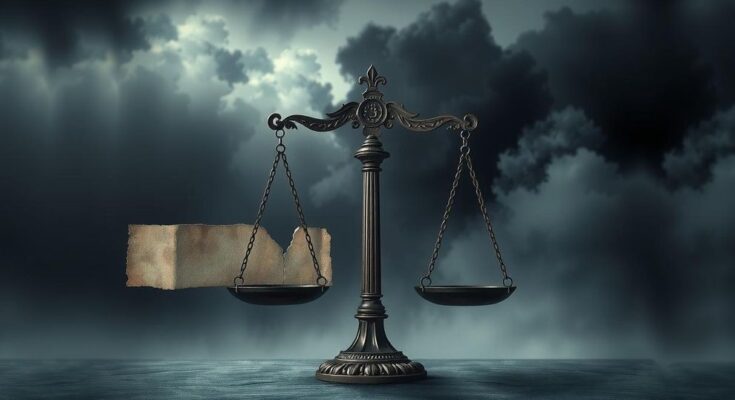Human rights groups in Peru are alarmed by a new anti-NGO law, limiting civil society’s ability to challenge human rights abuses. The law, backed by Congress, expands government oversight of international aid and poses significant risks to NGO autonomy. Criticism from activists highlights the law’s potential to obstruct justice for marginalized populations and raises concerns over broader civil rights issues amid a climate of governmental repression.
Human rights organizations in Peru have expressed grave concern over a newly passed anti-NGO law, which restricts civil society organizations from pursuing legal action against the state for human rights violations. Activists assert that this legislation, which was hastily approved by Congress with 81 votes in favor, will hinder access to justice for vulnerable populations.
The recent amendment enhances the Peruvian Agency for International Cooperation’s (APCI) power, increasing government oversight of international aid, yet threatens the autonomy of non-profit organizations. This move is a continuation of government-sponsored erosions of civil liberties and press freedom, raising alarms among international observers. Recent polls indicate that President Dina Boluarte and Congress enjoy approval ratings below 5%.
Proponents of the law claim it will increase transparency in funding for civil society and strengthen government control over foreign involvement. Alejandro Aguinaga, a member of the rightwing Fuerza Popular, contended that NGOs exploit international aid for personal gain at the expense of the impoverished. Aguinaga himself has faced accusations related to forced sterilizations of Indigenous women.
Carlos Rivera, director of the Legal Defense Institute, a Peruvian NGO, described the legislation as “simply brutal,” expressing concerns that it could severely impact legal representation for victims of human rights abuses, who are predominantly assisted by NGOs. He highlighted that the law penalizes NGOs with fines up to $500,000 for providing legal support against government actions.
Rivera characterized the law as the most unconstitutional in Peru since the 1995 amnesty laws, which impeded the prosecution of military and police personnel for human rights violations during the 1980-2000 conflict. He noted that these past laws were also deemed unconstitutional due to their contravention of justice rights and international human rights standards.
Julia Urrunaga, the director of the Environmental Investigation Agency for Peru, asserted that allegations against NGOs operating without accountability are unfounded, confirming that they have been regulated by APCI for over two decades. She criticized the legislation for undermining the ability of civil society organizations to operate independently in defense of citizens’ human rights.
The regional advocacy group Orpio condemned the law, framing it as a regression in safeguarding fundamental rights and judicial access for Indigenous peoples. Given Peru’s historical context of military governance and corruption, civil society organizations have been pivotal in national progress.
Furthermore, the ultra-conservative right in Peru has perpetuated the narrative that U.S. aid is politically exploited in the country. In an earlier measure, Donald Trump cut 83% of USAid programs for Peru. In her remarks last month, President Boluarte attacked NGOs, claiming that the discourse surrounding human rights should not be weaponized against state authority. Notably, charges against her are pending regarding her role in protests leading to nearly 50 deaths in late 2022 and early 2023, along with bribery allegations, which she has denied.
The recent passage of Peru’s anti-NGO law has sparked significant concern among human rights advocates who argue that it stifles the ability of civil society to hold the state accountable for human rights violations. As critiques mount, including assertions from law organizations and civil rights groups, the implications of this law could severely undermine justice for vulnerable communities. The government’s efforts to extend control over NGOs reflect broader issues of civil liberties, raising questions about the future of human rights in Peru under the current administration.
Original Source: www.theguardian.com




